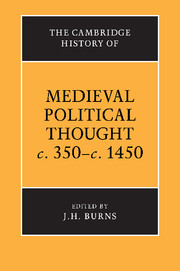Book contents
2 - Greek and Roman political theory
from I - Foundations
Published online by Cambridge University Press: 28 March 2008
Summary
Philosophers: metaphysics, ethics and political theory
European political philosophy had its first home in Greece, in a society made up of numerous small city-states, each with its own laws, customs and constitution. The term ‘politics’ in fact derives from ‘polis’ the Greek noun for ‘city-state’. The sheer variety of constitutions known in Greece – Aristotle and his school were to produce monographs on no less than 158 of them – meant that it was hardly possible there, as it may well have been in Egypt or Mesopotamia, to assume that there is only one way in which to run a society. Varied as the Greek states were, and subject to further variation by reform or revolution, they fell into three main classes – monarchy or rule by one man, described approvingly as ‘kingship’ or disapprovingly as ‘tyranny’; oligarchy or rule by a few, politely called ‘aristocracy’ or rule by the best; and democracy or rule by the entire adult male citizen body, known to later detractors as ‘ochlocracy’ or mob-rule. Their respective merits were hotly discussed from the time of Herodotus (3.80–2) onwards, even if some states, notably Sparta, a totalitarian society much admired for its discipline, stability and prowess in war, fell into none of these categories.
Different societies, it was observed, tend to produce different kinds of people. Democratically ruled Athenians, for instance, had a different character from oligarchically ruled Corinthians. Such observations, abundantly reinforced by a growing familiarity with the customs of foreign peoples, brought home the importance of social factors, of ‘nomos’, a term which meant not only ‘law’ but ‘convention’.
- Type
- Chapter
- Information
- Publisher: Cambridge University PressPrint publication year: 1988
References
- 1
- Cited by



